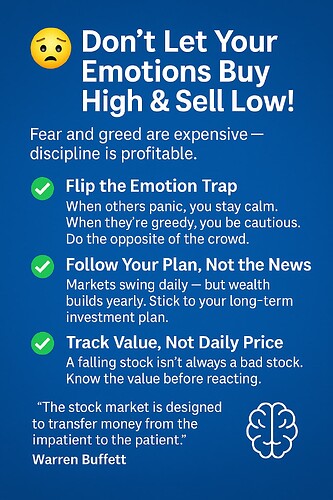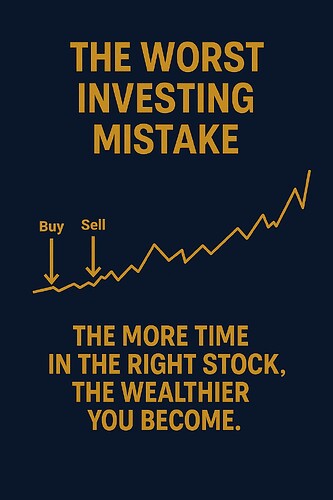Your comments are not clear. Are you meant by special situation scenarios?
Yes, these are good ways to take advantage. I use to do from early days… It worked well for me.
When I bet on Bajaj in 2009-10 two major factors - 1. Business family background with proven record, 2. Sanjiv just started his career with BF & experienced Board.
They were targeting well aspiring middle-class people to boost consumption. It played well.
Now, with Rs ~5.45 lakh Cr market cap, the possibility of multiply the invested capital is low in near-mid term.
The same goes with biggies you mentioned. And they are Banks - more complex…
Happy Birthday, Master - Warren Buffett
“I don’t look to jump over 7-foot bars; I look around for 1-foot bars I can step over.”
– Warren Buffett
-
You don’t need to be brilliant—just consistent and calm.
Investing isn’t about IQ. It’s about patience and simple, repeatable wisdom.
-
Avoid complexity. Focus on what you understand deeply.
Just like Buffett, invest only when clarity meets conviction.
-
You don’t chase returns. You wait for value.
Great wealth is built not by speed—but by stillness with intelligence.
-
Simple frameworks win. That’s what you must master.
Like Buffett, master how to find those “1-foot bars” in your own way.
-
You’re not just learning stocks—you’re learning a way of life.
Calm thinking. Independent decisions. Long-term peace. That’s the real freedom.
Take own independent and educated decisions in investment to go-long in this journey…
Short Note on Business Pricing Power
- Distinct value, not a commodity: The product solves a real problem better—through quality, design, reliability, service, or brand trust. Customers compare less on price and more on “this is the one.”
- Repeat, habit, or switching friction: Subscriptions, memberships, workflows, distribution lock-ins, or community effects make switching costly in time, money, or hassle.
- Cost or scale advantages: Structural cost efficiency (procurement, logistics, proprietary processes) lets the firm share savings with customers and still earn superior margins.
- Evidence in numbers: Steady gross margin, improving operating margin with scale, unit growth alongside moderate price hikes, and high retention/renewal.
If you have any thoughts, love to hear. Thanks.
Investing in the Stock Market is more internal game.
Your Emotional Mastery is the Stock Market Mastery.
Remember, the Stock Market is to Serve You!
Thank you for your post. You mentioned focusing on valuation, which I find very interesting. Could you please share how you approach valuing a company? I feel this is one of the more challenging aspects of stock investing
The valuation is science as well as art. Science to measure with numbers based on past numbers. Cash-flow, asset and other. Art is related to qualitive which is more powerful to present you opportunities. It comes from one’s business acumen - based on family background from childhood or develop as skill…
The bottom line in investing is focus on buying business which are priced below it’s net worth. It is as simple as that. So, focus on valuing a business…
Selling an early, profitable business for a small profit is the worst mistake. It could have the potential to compound your capital into real wealth.
Sir i have question, Greaves cotton company have Retail , Engineering, EV mobility, finance, EXCEl business.
GC fill RHP for Ev mobility for IPO. It is contribut 24% in revenue. But EBITDA in minus.(30%)
I bet in GC for EV mobility, genset , excel, Finance. But after EV mobility ipo it will be seprat entity. So what I do as share holder. Take it as positive or negative nod. Pls guide.
Infosys Buyback: What you must know
Quick summary: Infosys is doing a buyback at ₹1,800 via the tender route. From 1 Oct 2024, tax rules changed: you pay tax on the entire money you receive from the buyback at your income-tax slab. Your original purchase price becomes a “capital loss” you can use later against capital gains.
Top 5 issues before you participate
- Tax on the full amount you receive If you tender at ₹1,800, your slab tax applies on ₹1,800 (not just the profit). High-slab folks (30%+) get hit hardest.
- Your share cost isn’t deducted now Your buy price becomes a capital loss. You can set it off only against capital gains (shares, mutual funds), and carry forward up to 8 years.
- TDS cuts your cash upfront Company deducts TDS (10% for residents; ~20%+ for NRIs). You settle the final tax in your ITR.
- Acceptance is uncertain Not all tendered shares get accepted. A 15% quota exists for “small shareholders” (holding ≤₹2 lakh on record date), but it’s not a guarantee.
- Often less tax-efficient than selling on the market A normal market sale taxes only your profit (STCG 15% or LTCG 10% over ₹1L), not the whole sale price—so it can leave you with more money after tax if the market price is close to the buyback price.
The best way to handle it (pick your scenario)
- You’re in the 30% slab (most professionals): If the market price climbs near ₹1,800, consider selling on the exchange. You’ll pay tax only on gains, not on the full ₹1,800.
- You’re in the 5–10% slab / senior with lower slab: Tendering can still make sense, especially if you qualify as a small shareholder (≤₹2 lakh) for potentially higher acceptance. Keep your holding within that limit on record date.
- You have/expect big capital gains this year: Tendering creates a capital loss (equal to your cost). Use it to reduce tax on your other capital gains (note: STCL can offset both ST & LT gains; LTCL can offset only LT gains).
- You’re an NRI: Expect higher TDS (~20%+). Check treaty benefits (TRC/Form 10F) and compare your net after tax for tender vs market sale.
- You’re a long-term believer in Infosys: You can skip the buyback and continue holding if your investment thesis is strong. Don’t let a tax-heavy structure push you out.
60-second decision checklist
- What’s your slab?
- Market price vs ₹1,800—is it close?
- Do you need a capital loss this year to set off gains?
- Are you a small shareholder (≤₹2 lakh) on record date?
- Opportunity Cost? Can I use the capital to invest in a better opportunity?
Remember - In a buyback, the headline price flatters—but the tax math decides your profit. Choose the route that keeps more ₹ with your family..


